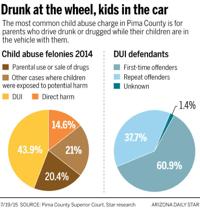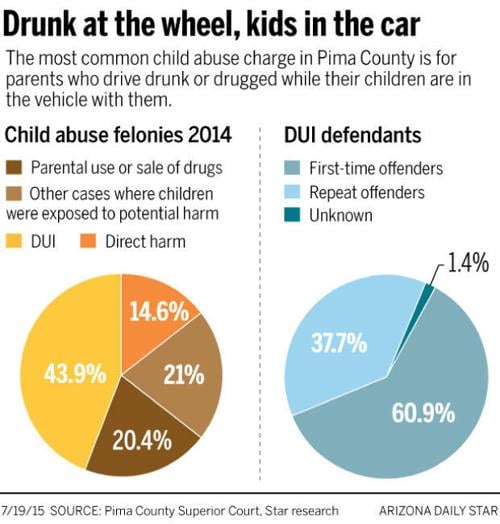The child endangerment and abuse felonies most commonly found in Pima County’s courtrooms have nothing to do with hitting children or neglecting to feed or bathe them.
Instead, they involve children riding in the car with a parent or caregiver who has been using drugs or alcohol.
An Arizona Daily Star analysis of the 157 defendants charged with at least one child abuse felony in 2014 found that nearly 80 percent involved children being exposed to potential harm, rather than having harm directly inflicted on them. Of these, nearly 44 percent involved children in cars with a drunk or drugged driver at the wheel.
“I can’t think of too many more dangerous situations than putting a child in a car with an impaired driver,” said Ryan Schmidt, supervisor of the vehicular offenses unit with the Pima County Attorney’s Office. “We take it very seriously.”
Parents drive while impaired far more often than the numbers show — and they rarely lose custody of their children for doing so. First, it’s likely that many impaired drivers reach their destination without being pulled over. Second, when there is an arrest, the other, nonoffending parent is often available to care for the child.
Beyond that, cases of impaired parents are investigated as DUI cases by the traffic unit, rather than as a child abuse case by the Crimes Against Children unit, said Sgt. Mark Bustamante of the Sheriff’s Department’s traffic unit.
“There is a difference between a child being in a car with a parent driving impaired from a child who is being struck at home,” he said. The Crimes Against Children unit typically deals with cases involving children being directly harmed.
Patrol deputies are required to notify the Department of Child Safety each time they arrest a person on suspicion of DUI when there are children in the car, Bustamante said. At that point, the investigation is deemed complete. Then it’s up to the child welfare agency to decide whether to follow up.
A COMMON OCCURRENCE
Drug and alcohol problems are common in Arizona’s child welfare cases, with more than 5,500 parents seeking help for addiction through a state program in 2013 and hundreds more participating in county drug courts each year.
Jason Frazier, program director for Mothers Against Drunk Driving Arizona, said that in his former career as a child welfare investigator, he saw frightening scenarios in which a child could easily have been killed.
One case involved a teen who was afraid to stand up to an intoxicated parent and got in the car — only to have the parent drive erratically and run red lights as the boy and his younger brother sat, terrified, in the back.
Another involved a parent who was clocked going 80 miles per hour in a 35 mph zone — with an unrestrained preschooler in the car.
“Children trust that their parents are going to keep them safe,” Frazier said. “My heart breaks for the kids who have to go through that.”
He said many of the DUI cases he saw as a child welfare investigator involved parents going through a divorce, and the same is true now that he’s with MADD.
“We get a lot of community concern calls from people saying, ‘I suspect my ex is drinking with my kids in the car,’” he said.
NOT THE FIRST TIME
An arrest for drunk or drugged driving with kids in the car is often not a first offense. Nearly 40 percent of defendants charged with driving drunk with their children in 2014 had a history of prior alcohol-related arrests, the Star’s analysis shows.
“The average first-time offender drives impaired 87 times before they are caught,” Frazier said.
In one case, a woman drove herself and her two children to the hospital on a September afternoon. Feeling ill, she intended to check in to the emergency room, court records showed.
When she showed up, hospital staff noticed signs of intoxication. A blood draw showed she had a blood alcohol level of 0.446 percent, more than five times the legal limit.
Before checking in at the hospital, she went into the restroom and drank some vodka, records show. After she was admitted, she drank even more as she waited for her treatment — this time beer, which she had hidden in her purse.
Tucson police showed up. This was her second alcohol-related arrest.
The Star is not identifying her because doing so would identify her children, who were not injured as a result of their mother’s drunk driving that day.
The Star’s analysis of 2014 cases showed that 83 percent had no reported injuries for minor victims. But not all children come out unscathed.
In January, a Phoenix mother driving along Interstate 10 lost control and rolled her SUV near the Cortaro Farms Road exit. Irma Linda Martinez was speeding and driving under the influence of alcohol, police said. Her 16-year-old daughter died, and her son was seriously injured. Martinez has been charged with second-degree murder.
charges faced
Adults who drive drunk or drugged with their own child in the car are typically charged with child abuse, a Class 5 felony, while those who drive with someone else’s child face the lesser count of endangerment, which is a Class 6 felony.
Joe St. Louis, a Tucson defense attorney who specializes in drunk driving cases, said the legal criteria of people being impaired “to the slightest degree” can be tricky when it comes to charging otherwise good parents with child abuse.
In cases where the impairment is slight, or where there hasn’t been an accident, he said child abuse charges are “used to convince people to plead guilty or risk being branded a child abuser.”
Nearly all defendants charged with both DUI and child abuse in 2014 entered into plea agreements, the Star analysis showed. Seventy percent of the defendants got a lesser charge of endangerment as opposed to the original child abuse charge.
“If there is an accident where the child is really put in danger, you could see them charging child abuse,” St. Louis said. “If you have to go to your employer and say, ‘I was convicted of a DUI,’ that’s a hard conversation. But if you have to say that you were convicted of child abuse, that’s probably an end-of-the-line conversation.”
Forty-three states — including Arizona — and the District of Columbia have laws that enhance penalties against people who drive drunk with a child passenger, data on MADD’s website shows. The laws vary in severity: In New York, for example, driving drunk with a child passenger under 16 is a child abuse felony; in Wisconsin, it’s a misdemeanor.
Schmidt, of the Pima County Attorney’s Office, said parents in many of the cases he’s handled realize after their arrest how much they endangered their child. The crime spans all socioeconomic classes, he said, and includes parents who would never otherwise risk hurting their child.
“When you are starting to becoming intoxicated, one of the first things to go is judgment,” he said. “Maybe you make choices that you wouldn’t make if you were sober.”





